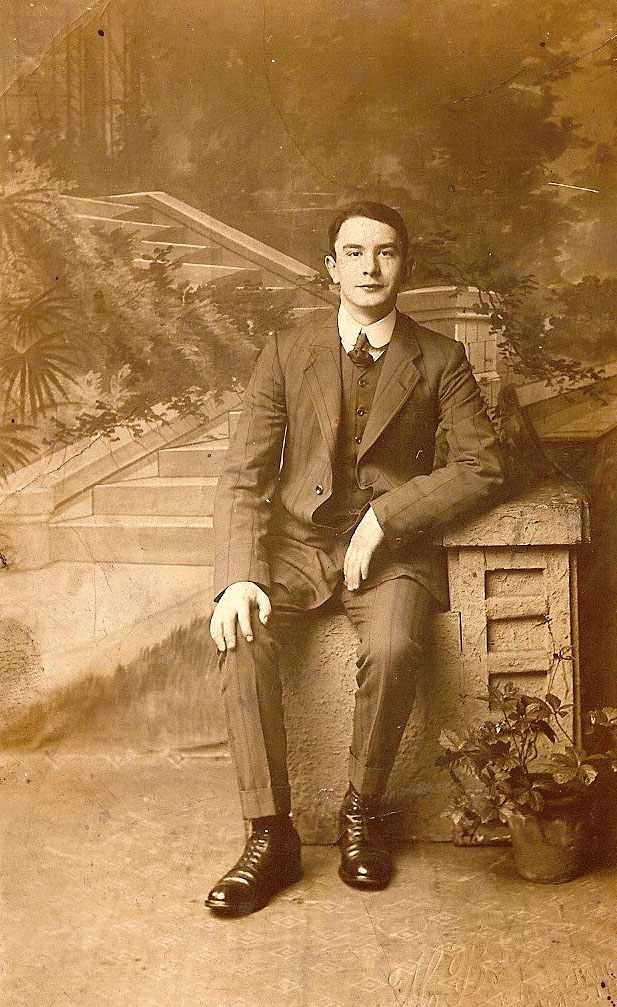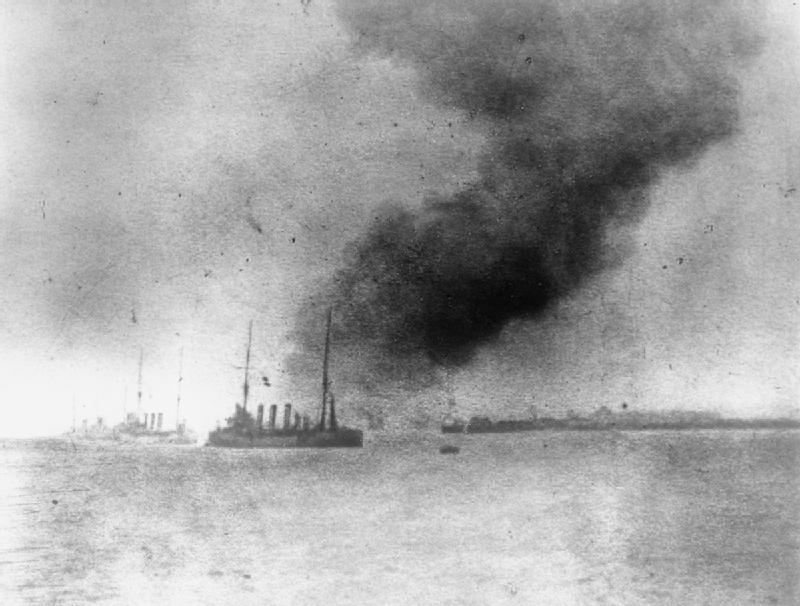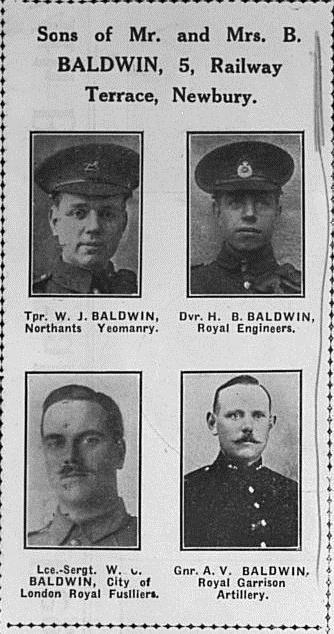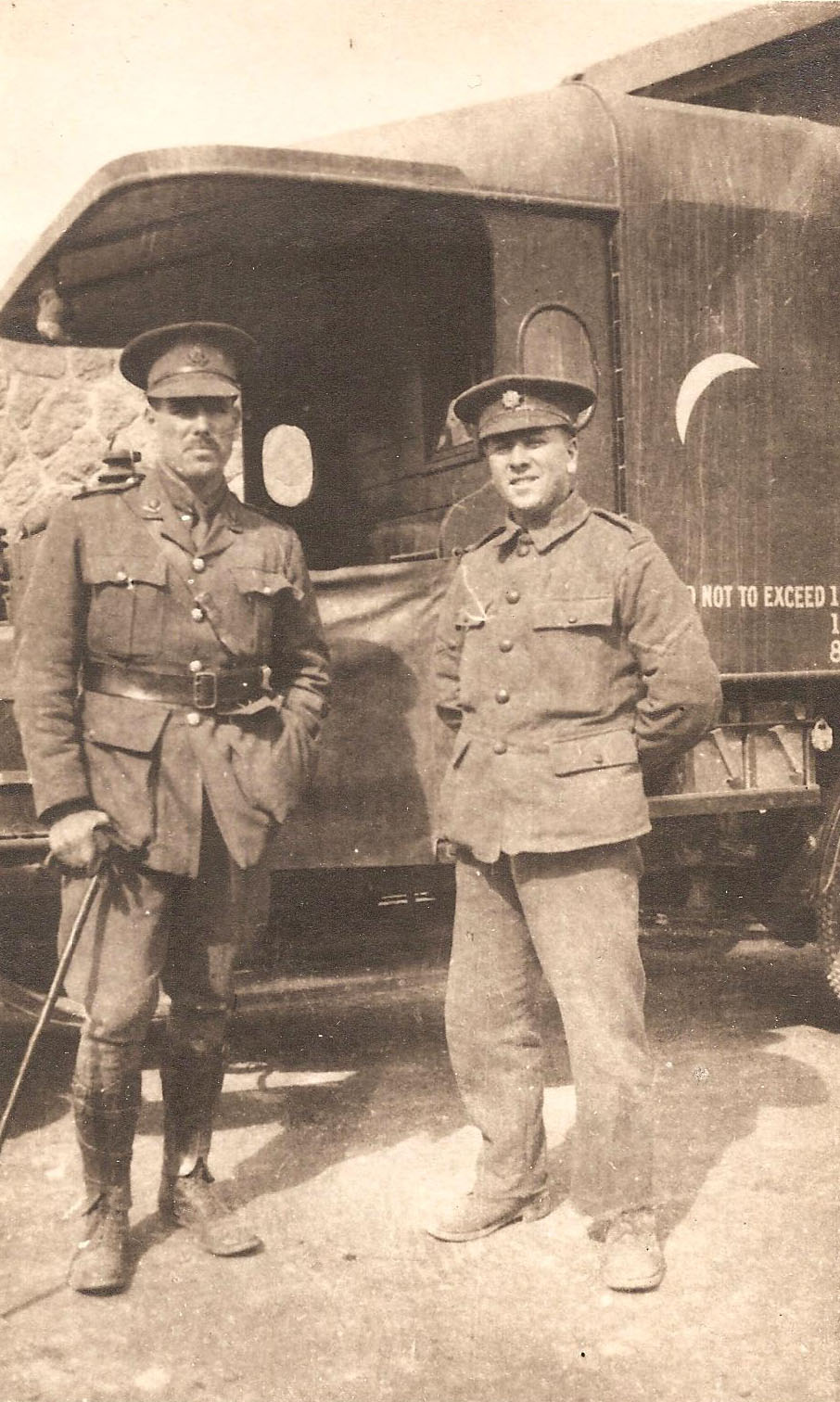Ernest Harry Brocks
Ship's Corporal 1st Class 210865 Ernest Harry Brocks, HMS Bulwark, Royal Navy
 Harry Brocks |
His schooling would have ended when he was 14 following which he would have begun his working life. It is not known what work he undertook, but it does not appear to have satisfied him, instead he opted for a more adventurous life and signed up with the Royal Navy. He joined up on his sixteenth birthday when he gave his civilian occupation as ‘clerk’. He was 5ft 4¼in tall with brown hair, blue eyes and a fresh complexion. His naval service record shows the many ships and shore establishments where he served and also shows his physical development: aged 18 he had grown only ¾ of an inch, but when he re-enlisted in March 1914 he was 5ft 7¼in tall with dark brown hair, brown eyes and a fresh complexion with scars on his left shin.
His Navy career began as a Boy 2nd Class and developed through the Signaller ranks to 2nd Yeoman of Signals – a junior Petty Officer, roughly equivalent to a Sergeant in the Army. At this stage, on 1 February 1911, his career path to a turn and he was appointed Ship’s Corporal. At the time he was serving on HMS Prince of Wales, but a month later he was ashore in Portsmouth for two months, probably receiving formal training for his new role. A Ship’s Corporal was a member of the Navy’s equivalent of the Military Police responsible for the prevention of crime and disorderly behaviour. Harry would have been one of a small number of Ship’s Corporals responsible to the Master-at-Arms, the Warrant Officer in charge of the ship’s police. He served in the role on HMS Royal Arthur and HMS Jupiter before being posted to HMS Bulwark on 4 June 1912.
In early 1913 Harry married his sweetheart, Edith, the daughter of Charles George and Mary Ann Langton who lived at ‘Ionia’, Priory Road, Newbury (now 13 Priory Road). The marriage took place in Newbury, possibly at St John’s church.
Although Harry had signed up on his sixteenth birthday it was not until his eighteenth that he could enlist fully, which he did, signing on for a 12 year term. In March 1914 this term ended but he did not leave, instead, on his thirtieth birthday he re-enlisted for a term given in his record as ‘to comp’. This was, in fact, a nine year enlistment – to complete the 21 years that would entitle him to a full pension.
.jpg) HMS Bulwark (Wikipedia) |
On 14 November the 5th Battle Squadron was transferred to Sheerness to guard against the feared German invasion. Twelve days later, at 7.50am on 26 November, HMS Bulwark was moored in the River Medway at Kethole Reach, 4 miles west of Sheerness when a powerful internal explosion ripped her apart. Only 14 of her 750 man crew were found alive, two of whom died in hospital of their wounds. In terms of loss of life this remains the second worst accidental explosion in the history of the United Kingdom.
That afternoon in the House of Commons the First Lord of the Admiralty, Winston Churchill, made the following statement: "I regret to say that I have some bad news for the House. The Bulwark battleship, which was lying in Sheerness this morning blew up at 7.53 a.m. The Vice and Rear Admirals who were present have reported their conviction it was an internal magazine explosion, which rent the ship asunder. There was apparently no upheaval of water. The ship had entirely disappeared when the smoke cleared away. An enquiry will be held tomorrow, which may possibly throw more light on this occurrence. The loss of the ship does not sensibly affect the military position, but I regret to say that the loss of life in very severe. Only twelve men were saved, and all the officers and rest of the crew, which, I suppose amounted to between 700 and 800 persons have perished. I think the House would wish me to express on its behalf the deep sympathy and sorrow with which the House had heard the news, and the sympathy it feels with those who have lost their relatives and friends."
 HMS Bulwark explodes (Wikipedia) |
Harry’s record ends with the entry ‘D D 26 November 1914 when HMS Bulwark was sunk’ – D D standing for Discharged Dead, the Navy’s traditional way of recording the death of a seaman.
Harry’s body was never recovered; there is a very small possibility that his was one of the fourteen unidentifiable bodies interred at the Naval Reservation Section in Gillingham (Woodlands Road) Cemetery. However, almost all of the crew went down with the Bulwark; the wreck has been designated as a war grave under the Military Remains Act and is marked by two buoys (East and West Bulwark) in the Medway Estuary. His name is remembered on the Portsmouth Naval Memorial on the seafront in Southsea.
Harry’s connection with Newbury is through his marriage to a Newbury girl, who lived in the town all her life. She never remarried and died in Newbury, aged 77, in 1955. It is a mystery why she did not put her husband’s name forward when the war memorial asked for names to be submitted. Perhaps she did and the committee concluded that Harry did not have a good enough Newbury connection – but this is very unlikely as others with even weaker connections are on the memorial. Perhaps they were estranged? Harry’s decision to re-enlist for another nine years only a year after they were married may have upset Edith, or could even have been a result of marital difficulties – marriage to a sailor who spent most of his life afloat cannot have been easy.
However, Edith was not Harry’s only Newbury connection, his cousin Horace Benjamin Baldwin, the son of his mother’s brother Benjamin, is remembered on tablet 3 of the Newbury War Memorial. Perhaps it was through his Newbury cousins that Harry originally met Edith?
Horace was one of four brothers who all served their country in the Great War – as reported in the local paper, which also noted Harry’s death in the Bulwark disaster:
Newbury Weekly News, 24 June 1915, p8 - Local War Notes
 The Baldwin Brothers |
Harry' two brothers mentioned in the newspaper article, [Arthur] William and [Frederick] John would be joined in uniform by Arthur.
 William and Albert |
William was another regular signing up in 1904 as a boy, aged 15, with the Royal Garrison Artillery. By 1911 he was a Sergeant Instructor of 'Gymnasia' (ie Physical Education). In 1913 he left the army for civilian life, though remaining in the Reserve. In August 1914 he was soon back in uniform and working as an instructor. He was rapidly promoted to Sergeant Major with the Army Gymnastics Staff on 15 September, Company Sergeant Major on 9 November and to 2nd Lieutenant on 19 December 1914. He was commissioned into the Worcestershire Regiment where he continued to shine. He ended the war as a Captain having been awarded a Military Cross. In 1919 he was awarded an MBE in appreciation of his work while seconded to the New Zealand Corps. He remained in the army after the war, retiring to the Reserve in 1927. John's medal card shows that he was a Sergeant in the AGS, suggesting that he too was a gymnastics instructor. The fact that he was awarded the Victory and British War Medals shows that he saw service in a theatre of war, probably in France. Albert had a more typical war, serving with the Army Service Corps and rising no further than Temporary Lance Corporal. But he too was a bit of a hero being mentioned in dispatches in 1918.
Thanks to Antony Saunders for the Brocks family photographs.

Find a memorial :
| Died this day: | |
| 02 March 1917 | |
| Frederick Hughes | |
| Yattendon |

Like this site? Show your appreciation through a donation to a great charity.